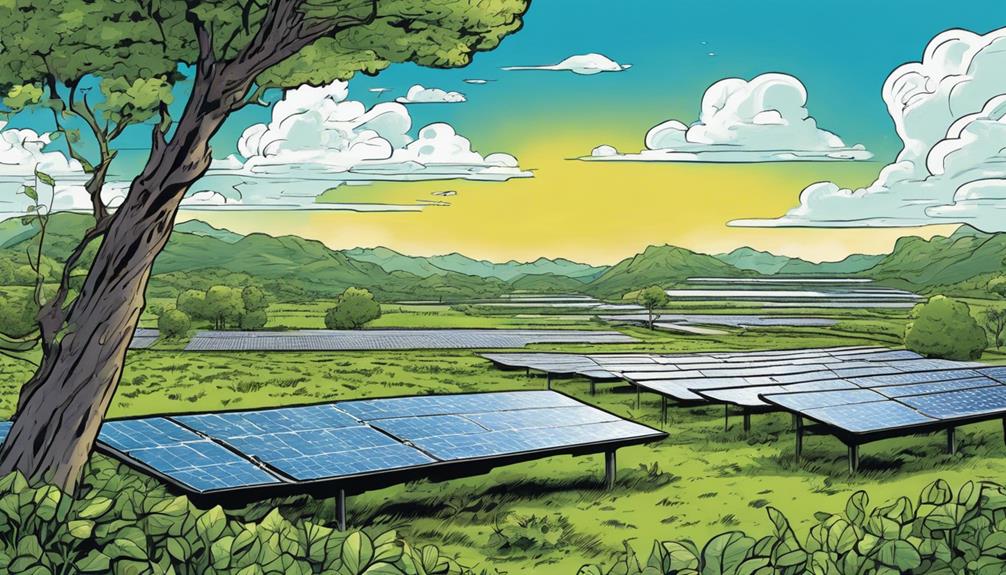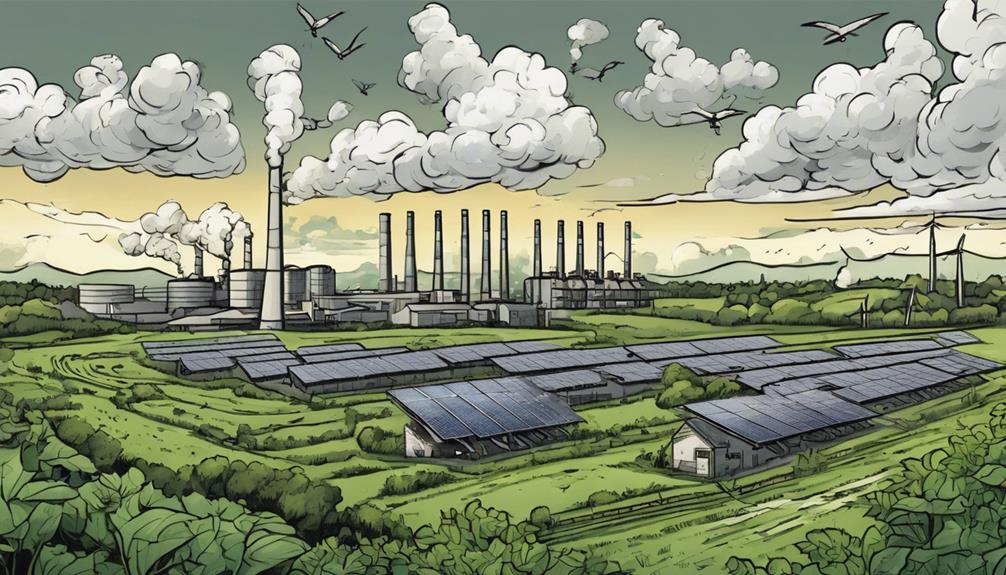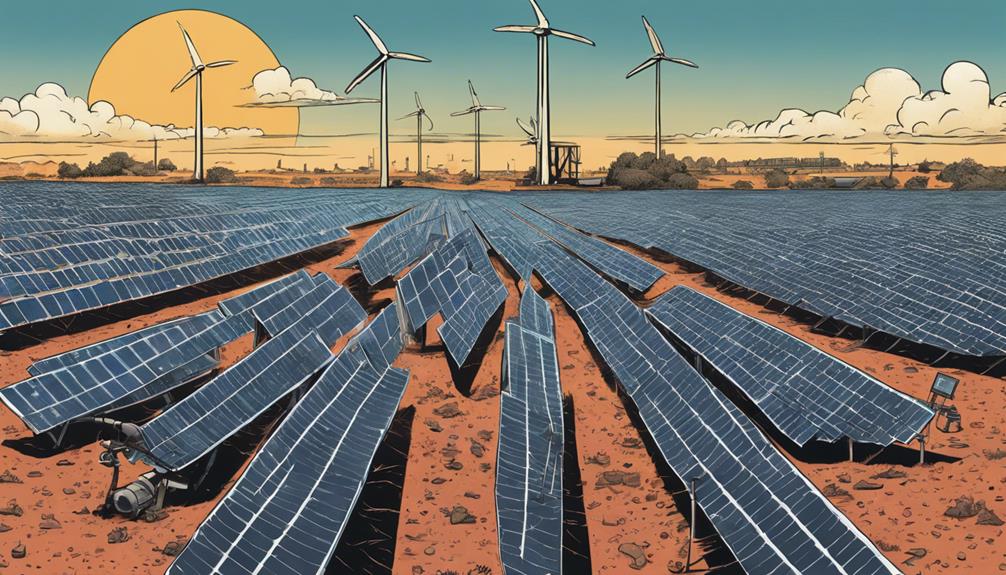As I explore the world of solar energy, I've uncovered its numerous advantages, including cost-effectiveness, reduced reliance on traditional sources, and lower electricity bills. However, I've also discovered limitations like high upfront costs, weather-related performance issues, and suitability concerns for regions with limited sunlight. But what really caught my attention was the impact of wind on solar panel efficiency – it's a game-changer. If you're curious about the intricacies of solar energy, from its hazards to maintenance essentials, and how governments are incentivizing its adoption, then let's dive deeper into the fascinating world of solar energy.
Key Takeaways
- Solar energy offers cost-effectiveness and energy independence, but high upfront costs and weather limitations hinder its adoption.
- Wind enhances solar panel performance by providing a cooling effect, removing dust, and facilitating heat dissipation.
- Despite its benefits, solar energy generation and production can have negative environmental impacts, such as toxic waste generation and greenhouse gas emissions.
- Regular maintenance, including cleaning and inspections, is crucial to ensure peak solar panel efficiency and prolong their lifespan.
- Government incentives, such as tax credits and net metering laws, make solar energy more accessible and affordable worldwide.
The Advantages of Solar Energy

As I explore the world of solar energy, I'm struck by the numerous advantages it offers. One of the most notable benefits of solar energy is its cost-effectiveness, with prices lower than electricity in many areas, making it an attractive option for developing countries with limited access to affordable electricity.
This renewable energy source allows households and businesses to generate their own electricity, reducing their reliance on traditional energy sources and lowering their electricity bills.
I'm also impressed by the global impact of solar energy, which can lead to a reduced reliance on expensive fossil fuels. Additionally, many governments offer incentives and leasing options, making solar energy a more accessible and cost-effective choice for users.
Limitations of Solar Energy

While solar energy offers numerous benefits, its high upfront costs, though mitigated by government incentives and leasing options, can still be a significant barrier to adoption for many individuals and businesses.
In addition, solar panels require minimal maintenance, but their performance can be impacted by extreme weather conditions like snow and wind. This means that regions with limited sunlight exposure or consistent cloud cover may not be suitable for solar energy generation.
Moreover, solar panels can be affected by dust and debris accumulation, which can reduce their efficiency. Despite these limitations, the benefits of solar energy make it a viable and cost-effective renewable energy solution, especially with the right incentives and maintenance practices in place.
Solar Energy Efficiency Explained

I've discovered that wind plays a surprising role in enhancing solar panel performance, particularly in cooler climates where it provides a cooling effect and prevents overheating. This may seem counterintuitive, but wind can actually improve solar energy efficiency.
- Wind helps remove dust and debris from solar panels, ensuring optimal sunlight absorption.
- Increased airflow around solar panels, facilitated by wind, helps dissipate heat generated during energy conversion.
- Wind prevents snow accumulation on solar panels in colder climates, ensuring efficiency during winter months.
- The combination of wind and solar energy can create a more efficient and sustainable energy system.
Understanding Solar Energy Hazards

Despite its numerous benefits, solar energy production comes with a darker side: the generation of toxic wastes and pollutants that can harm the environment and human health.
As I dig deeper into the world of solar energy, I'm confronted with the harsh reality of its production process. The manufacturing of solar panels releases potent greenhouse gases and toxic substances, contaminating soil and water sources if not managed properly.
It's important we acknowledge these hazards and implement sustainable practices to minimize the negative environmental impact. By doing so, we can guarantee that the benefits of solar energy outweigh its drawbacks, and we can move towards a cleaner, greener future.
Environmental Impact of Production

As I examine the production process of solar panels, I'm struck by the sheer amount of toxic waste generated, which can have devastating consequences for the environment if not handled responsibly. The production of solar panels isn't as clean as it seems, and recognizing the environmental impact of this process is imperative.
Toxic chemicals like lead, cadmium, and mercury are used in the manufacturing process, posing a significant threat to ecosystems and human health.
Improper disposal of these hazardous materials can contaminate soil and water sources, leading to long-term environmental damage.
The energy required to produce solar panels also generates greenhouse gas emissions, contributing to climate change.
Sustainable practices and responsible waste management are essential to mitigate the negative environmental impact of solar energy production.
Solar Panel Maintenance Essentials

You'll want to perform regular cleaning and inspections to make sure your solar panels operate at peak efficiency and extend their lifespan.
I've learned that biannual cleaning is important to remove dirt, dust, and debris that can block sunlight and reduce energy output.
It's also vital to inspect for signs of wear and tear, such as loose connections or damaged panels.
I recommend checking for any vegetation growth or animal nesting under the panels, as these can also impact performance.
By staying on top of maintenance, you'll secure your solar panels continue to generate clean energy efficiently.
Global Adoption and Incentives

As I explore the world of solar energy, I'm excited to investigate the global adoption and incentives that are driving its growth.
Governments worldwide are now offering attractive incentives to encourage the adoption of solar energy, recognizing its potential to reduce greenhouse gas emissions and mitigate climate change.
Some of the key incentives include:
- Tax credits and rebates for individuals and businesses that invest in solar energy systems
- Net metering laws that allow households to sell excess energy back to the grid
- Low-interest loans and grants for solar energy projects
- Renewable portfolio standards that require utilities to generate a certain percentage of their electricity from solar energy
These incentives are playing an essential role in making solar energy a more accessible and affordable option for people around the world.
Frequently Asked Questions
Can Solar Panels Be Used to Power Electric Vehicles?
"I can confidently say that solar panels can power electric vehicles, and it's an exciting prospect – imagine charging your car with clean energy from the sun, reducing your carbon footprint even further!"
How Does Solar Energy Impact Local Wildlife Habitats and Ecosystems?
As I explore the impact of solar energy on local wildlife habitats, I find that large-scale solar farms can disrupt natural habitats, but thoughtful placement and design can minimize harm to ecosystems and wildlife.
Are There Any Alternatives to Silicon-Based Solar Panels?
"Breaking news from the future – I'm thrilled to report that yes, alternatives to silicon-based solar panels exist Brushing aside silicon, perovskite solar cells and organic photovoltaic cells are emerging as promising, eco-friendly contenders."
Can Solar Energy Be Stored for Use During Power Outages?
I'd love to know if solar energy can be stored for use during power outages – luckily, yes, it can be stored in batteries or other energy storage systems, providing backup power when needed.
How Does Solar Energy Compare to Other Renewable Energy Sources in Terms of Cost?
When comparing solar energy to other renewables, I find it's often the most cost-effective option, especially in areas with abundant sunlight, offering a lower overall cost than wind, hydro, or geothermal energy sources.
What are the Advantages of Solar Energy Compared to Other Renewable Energy Sources?
Solar energy offers numerous renewable energy benefits compared to other sources. It is abundant, eco-friendly, and sustainable. Unlike fossil fuels, solar power produces no greenhouse gases, reducing environmental impact. Solar panels are low maintenance and can be installed in remote locations. Overall, solar energy brings significant renewable energy benefits to the table.
Conclusion
As I peel back the layers of solar energy, I'm reminded of an onion – multifaceted and complex. While it's a beacon of hope in the fight against climate change, its production comes with a dark underbelly.
As we harness the sun's power, we must acknowledge the trade-offs and work towards a more sustainable future. By doing so, we can reveal the full potential of solar energy and create a brighter tomorrow.









